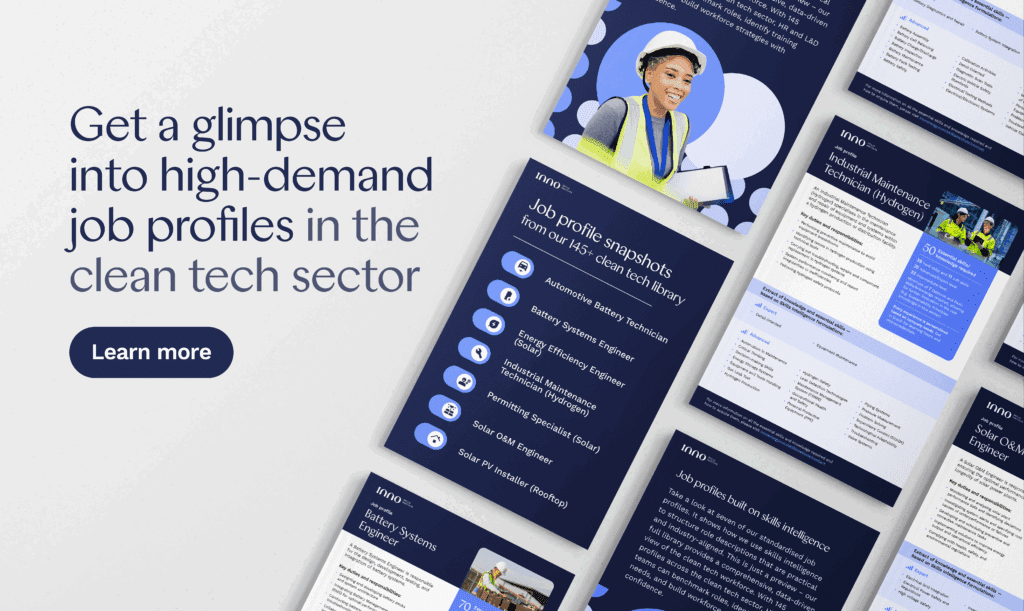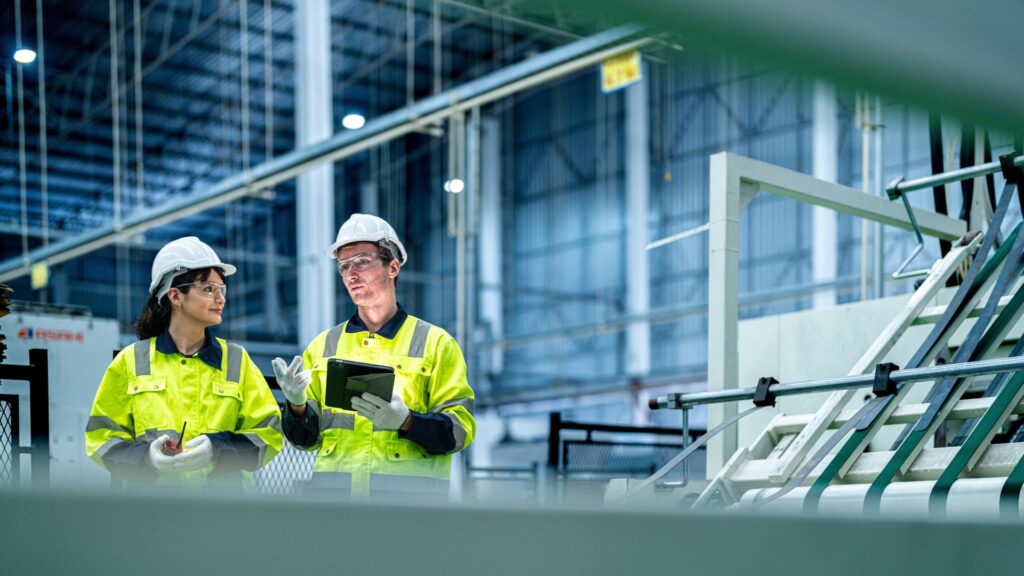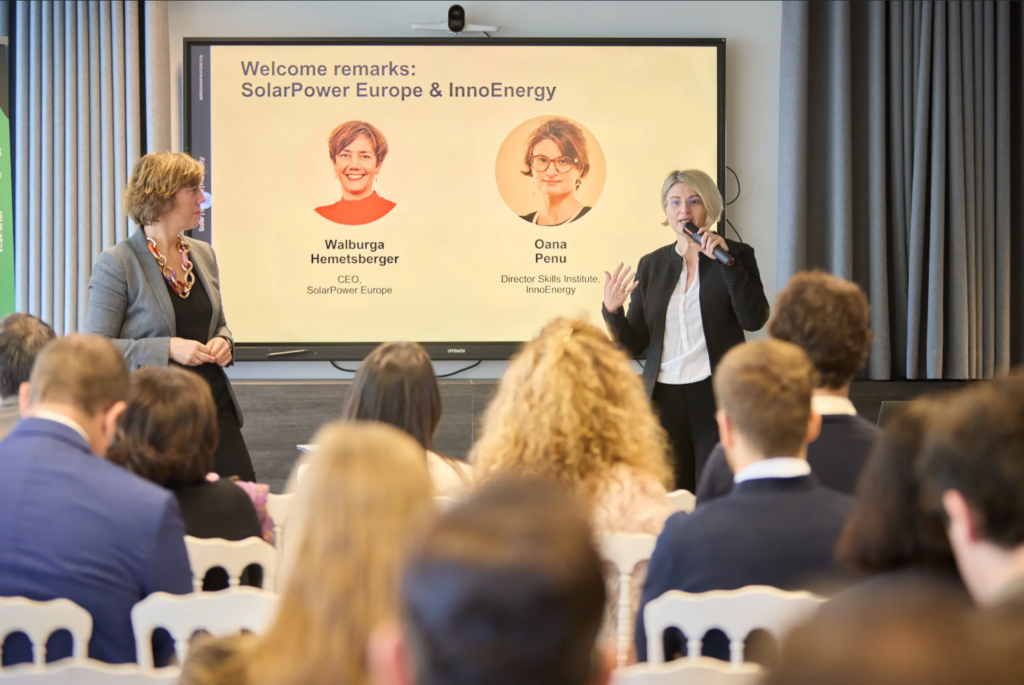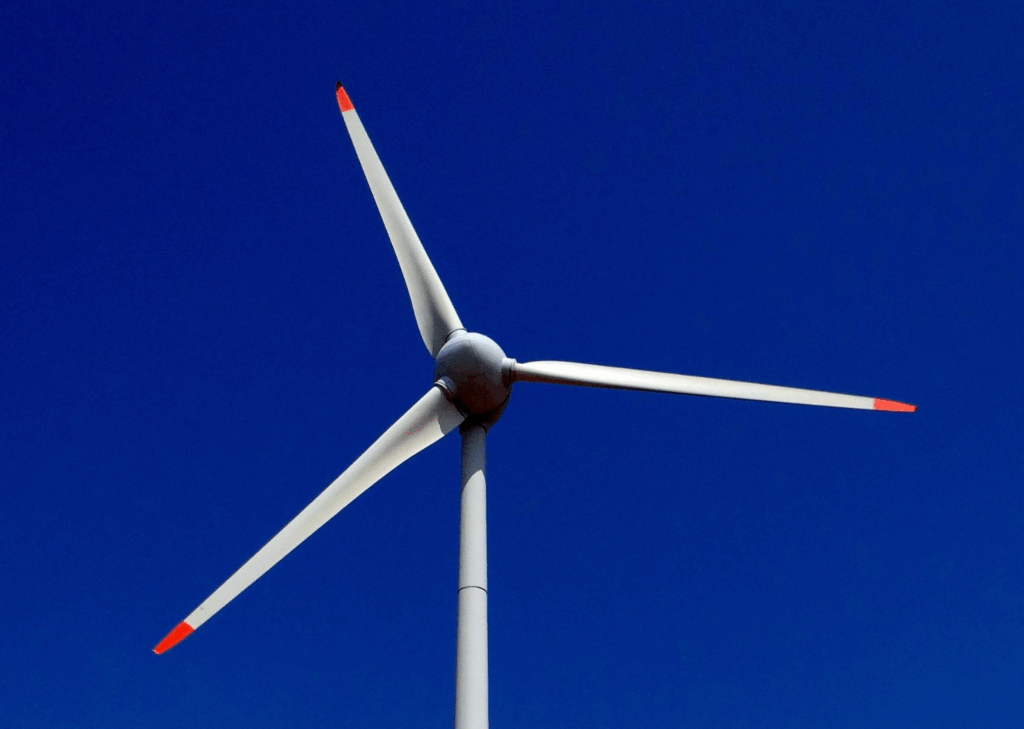As Europe’s energy landscape shifts, many of the region’s largest energy organisations are racing to meet decarbonisation targets, invest in electrification, biofuels, and battery infrastructure, as well as other initiatives. Yet amidst this transition, one question is often overlooked: who will build the workforce to deliver it?
A workforce mismatch threatens decarbonisation
While companies focus intensely on securing renewable contracts or purchasing new technology, a deeper challenge lurks: the clean tech skills gap. Across Europe, demand for green-skilled workers grew by 11.6% between 2023 and 2024, while supply increased by just 5.6% (CSE, 2025). Job seekers with green skills were 54.6% more likely to be hired than the average worker (ESG News, 2024).
The solar sector alone illustrates the scale: from 648,000 jobs in 2023, the sector needs to double that workforce to over 1 million by 2025 to sustain growth and the need for clean tech transformation. (SolarPower Europe, 2024). Projections estimate that 3.5 million net zero technology jobs will materialise by 2030 in the renewables sector, and Europe must invest between €1.7 billion and €4.1 billion in retraining and upskilling to support this expansion (Digital Skills and Jobs Platform, 2024).
Without urgent intervention, energy players risk delayed projects, non‑compliance, budget overruns and frustrated internal teams.
Why procurement isn’t enough
Many of these large enterprises lean on procurement and operations to solve workforce challenges: outsourcing recruitment or squeezing supplier agreements. But when skills are rare, external hires alone simply can’t scale fast enough.
Instead, companies need to unlock internal hidden talent, bridging the skills gap via role‑based upskilling and lifelong learning initiatives. That’s where HR and L&D, not procurement, become decisive players and deliver strategic impact: measurable, scalable, transformational.
Upskilling is too often dismissed as a cost centre. In fact, data shows it drives measurable business returns:
- BMW invests €400 million annually in training, achieving faster innovation, shorter project cycles, and improved retention by equipping existing staff with new EV and digital skills (Reuters, 2024).
- Half of the global workforce has already taken part in long-term learning programmes, up from 41% just a few years ago, and 77% of employers expect upskilling to boost productivity, while 70% link it to stronger competitiveness (WEF, 2025).
Moreover, upskilling is becoming a strategic necessity:
- Skills-based hiring commands higher wage premiums than academic degrees in green and AI jobs, showing that market demand rewards organisations that prioritise skills-first workforce strategies (Cornell University, 2023).
- The global green skills gap is projected to reach 7 million workers by 2030, a shortfall that could delay clean-energy build-out and add 0.1 °C to global warming if companies fail to reskill their current workforce (BCG, 2023).
As HR and L&D keep turning into Skills Intelligence Centres, companies turn their transitional strategies into operational execution: defining which roles need upskilling, mapping against EU standards, certifying learning outcomes, integrating with HRIS/LMS systems and tracking individual and team performance.
Addressing common concerns head‑on
One of the most frequent concerns from leadership teams is the fear that upskilling will take employees away from their work and reduce productivity. In reality, when training is delivered through modular, on‑demand microlearning and blended formats, disruption is minimal. Pilots have shown that teams can upskill incrementally, applying new knowledge in real time without halting operations.
Another perceived barrier is the challenge of proving return on investment. This is where a structured, measurable approach makes the difference. By tracking certified competencies, project readiness and performance improvements through skills dashboards, HR and L&D leaders can directly link training to tangible business outcomes, from faster project delivery to compliance readiness.
The Green Talent Accelerator — the solution
The Green Talent Accelerator by InnoEnergy Skills Institute has been designed to encourage organisations to take a central role in their clean tech transformation. It begins with a comprehensive Skills Intelligence audit, pinpointing exactly where the most critical gaps lie and identifying existing talent that can be redeployed into emerging roles. From there, the framework delivers role‑based training developed with industry partners and aligned to European standards, ensuring relevance and immediate applicability.
The Green Talent Accelerator is built to integrate into existing HR tech stacks, reducing administrative burden and making it possible to scale training across multiple business units quickly. Progress and outcomes are tracked through dedicated dashboards, providing a clear view of reduced downtime, accelerated project timelines, improved compliance readiness and stronger ROI.
We power your decarbonisation strategy with the solutions and proof to deliver it.
From support to strategy: the role of HR in clean tech transition
As organisations accelerate their clean tech transition, HR and L&D have a unique opportunity to shape the workforce that will make those ambitions a reality. While procurement can secure equipment and operations can oversee deployment, it is HR that ensures the people behind the transition have the skills to deliver.
Taking ownership of the skills agenda means more than providing training; it means aligning workforce capabilities with strategic business goals, ensuring teams are ready for electrification, renewables and biofuels, amongst other industries. Structured frameworks like the Green Talent Accelerator make it possible to identify gaps, design targeted learning and measure the impact on both people and projects.
With Europe committing billions to workforce development and demand for renewable talent outpacing supply, now is the moment for HR to step confidently into a more strategic role. Those who act will help secure their organisation’s place in a fast‑evolving market; those who wait risk being left behind.
Sounds like the right approach for your organisation?
If you’re ready to align your workforce capabilities with your clean tech ambitions, our team can help. Get in touch with us to explore how the Green Talent Accelerator can turn your strategy into action.




